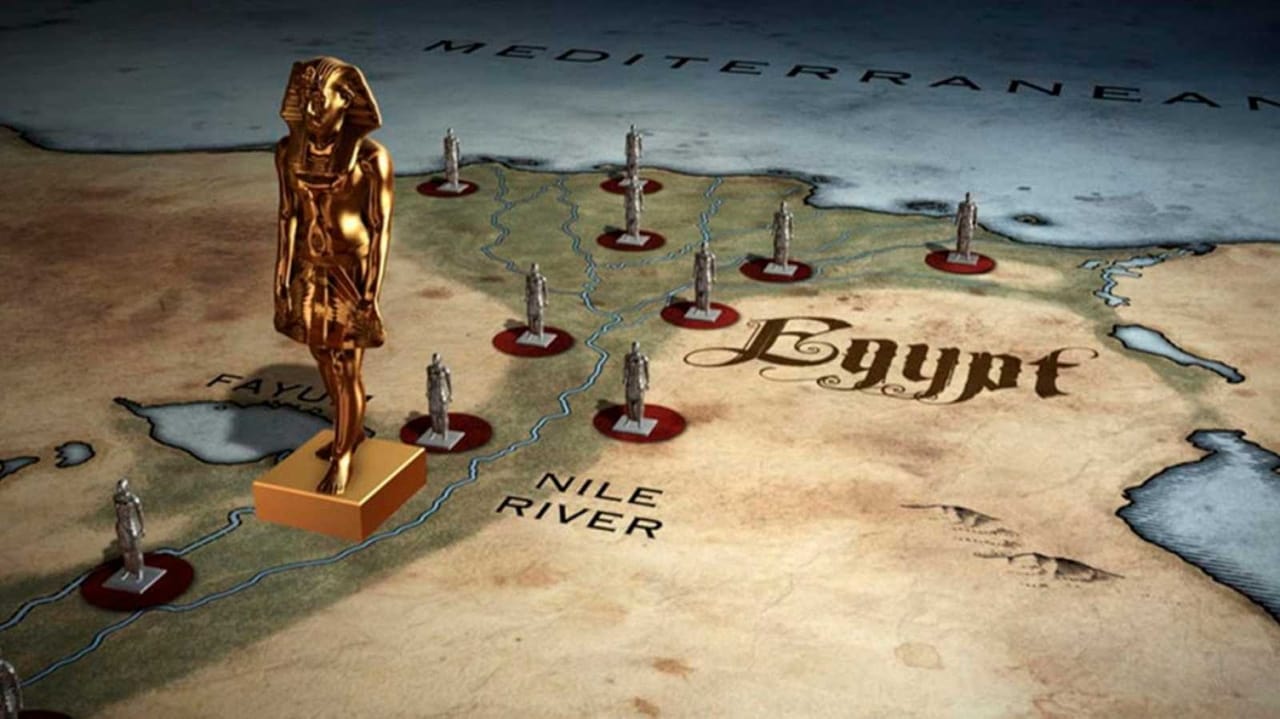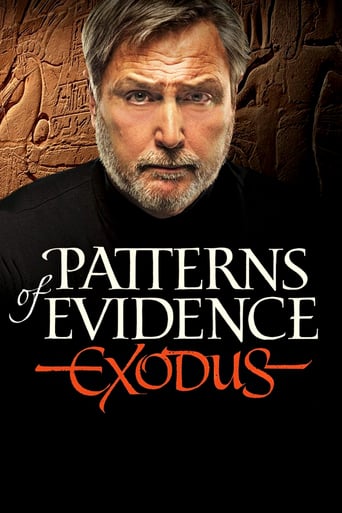

Wonderful character development!
... View MoreWhat makes it different from others?
... View MorePurely Joyful Movie!
... View MoreI enjoyed watching this film and would recommend other to give it a try , (as I am) but this movie, although enjoyable to watch due to the better than average acting fails to add anything new to its storyline that is all too familiar to these types of movies.
... View MoreThis is either religious propaganda disguised as a scientific documentary or moneymaking by the use of spectacular titles and themes. Don't get me wrong, technically, this film is pretty well made and you will probably only see the big problems with the theories shown in this film, if you have some experience in science and/or archaeology.If you have, you will have a hard time sitting through this. To not make this review too long, I'll concentrate on the problems I was offended by the most.First off, the filmmaker and the scientists he interviews and bases his views on are highly biased. They want to find evidence of the exodus in the first place and then find it by ignoring context. This is not only openly admitted by the filmmaker speaking off screen, it is also very sloppy scientific work - if you can call it scientific at all.An example: They find Semitic ruins in Egypt and say it cannot be proved that these were inhabited by Hebrews, only that these people seem to come from Syria and Canaan. But this was irrelevant, because we couldn't distinguish them from the Egyptians culturally anyway. So, by ignoring the fact you can't say they were Hebrews they spin it to "it might be Hebrews", which is scientifically very sloppy.I also literally face-palmed when David Rohl explains why there was no corpse in the supposed tomb of Joseph. The biblical answer would be that the Jews took the mummy/corpse and brought it to the "Holy Land" - as it was written in the bible. So, this must be it, Rohl says. When the filmmaker asks what about grave robbers, Rohl answers no grave robber would be interested in mummies at all. They would take the jewelry, but not the bones as those would be worth nothing. This is just wrong. Mummies and their bones were used as medicine during European medieval times, f.e. which is part of why we don't have the mummies of many famous Pharaoes despite having found their tombs. Grave robbers could have made good money with the corpse and this might be the reason it is not there. Sadly, nothing else is said about this in the documentary: Were there signs of grave robbers at all? If so, do we know when they broke into the tomb? This would be interesting.But sadly, no real other views than those of the defenders of this "theory" are given much room in this film... And why should the? To falsify the weak statements made in this film?My opinion on this film is: Just watch the beginning, when Manfred Beitak says: "It's a very weak affair." Because that basically sums up this film.4 stars for good editing and the overall interesting topic. Only watch it if you've made up your mind about it anyway and believe in this. Or watch it while being highly critical and do some additional research as hobby detective work to debunk it. Everything else is a waste of time.My advice for the filmmakers: read the bible as what it was supposed to be: a religious text. Not a historical one. (And no, Moses was not the first historian as proposed in this film.)
... View MoreI am Christian to begin with, and I'm proud to say that my faith is strong in The Lord. But I'm not a scientist, though I am curious and often times seek the truth. It's very much faith empowering how this film elaborates on the story of Exodus, at the same time comparing it with coherent scientific evidence. Yet this movie also still nicely leaves room for faith. As faith is the basis of things we can't see, one needs faith to understand the reasoning this movie presented, while the evidence itself still gets debated by scientists. I for one at prior to this movie wasn't aware of the gap of date settings between scientists, or even the whole counter-idea of the Exodus itself, as being a myth. At a skeptic's perspective this may prove that ignorance is bliss. But I see it as the fact that faith in God can't be distinguished by mere scientists' wisdom, which base their findings on mere rags and tatters.
... View MoreThe question of whether or not there is a God beyond the world who has sufficient interest in our world to occasionally intervene into human history is quite possibly the most profound question that we wrestle with. Patterns of Evidence: The Exodus is a documentary about one man's attempt to wrestle with this. Tim Mahoney is the name of that man. He comes across as a rather ordinary person. He's not an Indiana Jones with a pistol, a bull-whip, and a PhD in archeology. He's not a professor of history who needs to compete with his peers. He's not one of the sensationalist pundits of alternative history who talks about lost civilizations led by extraterrestrial beings. He comes across as a normal fellow. For me this is a plus to the documentary. He's ratable. He reminds me of me and hundreds of others I have met. Maybe the film is a bit slow at first--but this serves to build up rapport. It's easy to empathize and sympathize with his plight. The film starts of making it clear that Tim grew up believing that the amazing stories in the book titled Exodus were true. There is a God and that God isn't averse to embarrassing the mythological gods to make it clear that He is there, he's serious, and he has purposes for the people he created. This worldview of course created a lot of meaning in life for Tim. And all that gets shaken by the fact that there seems to be no evidence for these stories. Tim isn't just a fideist who can just believe something blindly just because he grew up with it. He really cares about what the leading voices in the scholarly disciplines of Egyptology and ancient near-eastern history have to say. The film starts with Tim's faith in a God-who-cares-and-acts being shaken. And this is not just for dramatic effect. The sincerity shines through in various ways. The very fact that he interviews scholars who have views that are hostile to his faith is one such way. Tim's quest begins not for evidence to prop up his wobbly faith but for truth. That shines through too and seems admirable. Also impressive to me is how Tim doesn't just collecting books by experts. He travels to those experts, interviews them in person, and tapes them! This film is very rich in interviews with some very fascinating people. He collects opinions from a variety of knowledgeable people and attempts to find out if there really is (or isn't) any persuasive evidence of Jews flourishing in Egypt, of Jews becoming slaves in Egypt, of Egypt suffering calamities, of Jews leaving Egypt en masse suddenly, and of city-states in Canaan being conquered and destroyed. Early into the film I was depressed as I began to hear so many respectable scholars say that there is no evidence whatsoever. But as the story unfolds it begins to become clear why so many scholars do not see evidence for these things. I was repeatedly impressed by how Tim's team interviewed the scholars who say the Exodus didn't happen as Moses wrote it, how they interviewed at least four Christian historians who agree that Exodus is true history but who don't agree with one another on all the details and dating, and how the main scholar they interviewed and paid the most attention to (David Rohl) was surprisingly an agnostic (unsure if there is a God) who happens to see that the Exodus account has a tremendous amount of evidence going for it--evidence that most of us have never heard of. As the plot thickens and the details and dates began to become too cumbersome for my mind to juggle, some color-coded, computer-animated timelines come to the rescue. They attempt to show different patterns of evidence that they found and attempt to see if the different patterns can possibly be lined up in a way the corroborative rather than conflicting way. The computer animation was extremely helpful for making the complex sensible and for helping to visualize what the archaeological digs prove. The quality of the CGI was very good. Thumbs up there. This film doesn't pretend to solve the problems of evidence patterns and problems in the standard system of dating. But it provides a very tantalizing and persuasive case that there really are a few different patterns of evidence that are very significant, overlooked, and likely able to be harmonized in the future. It serves as an encouragement and challenge to the scholars to look at the patterns again, rethink things, and not rest on their assumptions. It may also serve as an encouragement and challenge to the rest of us non-scholars to not be afraid to learn from the scholars (keeping in mind there is wisdom in having a multitude of counselors) and take part in the process of the seeking of the truth. I love how an ordinary guy with questions, cameras, and film editing software can care about a question enough to invest a decade of his life and savings into pursuing it. And I appreciate how he shared his tantalizing findings!
... View MoreExodus 6:7 I will take you as my people, and I will be your God. Then you will know that I am Adonai your God, who freed you from the forced labor of the Egyptians.G-d has never called on us to only believe in Him, but He always blesses us by showing His works so we may KNOW He is G-d. Tim Mahoney taking us on his journey does just this! Tim walks us through events, timelines and places of the Exodus with many experts giving their opinions regarding the 5 W's of the story. This documentary is fair to all especially regarding the point of view Mr. Mahoney. He is candid about his religious background and desire to have knowledge of this event in history.For a 2 hour and 40 minute documentary time flew as the journey is compelling, well paced and visually enjoyable. The knowledge provided will encourage you to look at the work David Rohl, John Bimson, Eilat Mazar and many other scholars/archaeologist are doing.Thank you, Tim Mahoney, for a job well done!
... View More